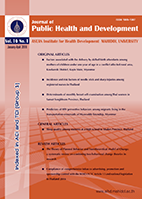Sleep quality among students at a high school in Sisaket Province, Thailand
Main Article Content
Abstract
At present, only 20 percent of adolescents get adequate sleep of 8 hours up to nine hours. Inadequate sleep affects overall physical and mental health, including changes in behavior, personality, emotions, and classroom performances. This cross-sectional research aimed to evaluate the sleep quality of high school adolescents and related factors that affect it. The participants were 125 high school students from a selected secondary school in Sisaket Province. Data were collected by a questionnaire that focused on socio-demographic information, health perceptions, sleep hygiene, a Thai stress test, and the Thai version of the Pittsburgh Sleep Quality Index questionnaire (Thai-PSQI). This data was analyzed by descriptive statistics and multiple logistic regression.
Results showed that 75.2% of the students had “poor” sleep habits (global score of PSQI >5), 48.0% of the students slept more than 7 hours each night, and 85.7% had a mild level of stress. Most of them woke up in the middle of the night or early, and experienced cold or overheating sensations and nightmares. Other factors that interfered with their sleep were stress and hunger. Multiple logistic regression showed that the factors that affected the students’ quality of sleep were gender, using a smart phone before going to bed, and stress levels (p-value = 0.026, 0.025 and 0.048, respectively). Female had 3.71 times higher risk of poor sleep quality compared to male (95% CI = 1.17-11.76). Mild stress had 3.18 times higher risk compared to normal one (95% CI = 1.16-8.75). Using a smartphone before bed every day had 2.85 times higher risk compared to not using a smartphone everyday (95% CI = 1.01-8.02).
This result recommends that parents should control the use of smartphones before sleeping and promote cognitive coping strategies for stress to improve their children’s sleep quality. In addition, schools and departments of health should promote healthy activities to reduce students’ stress.


